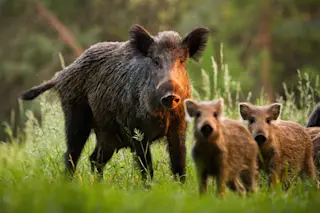When you think of great survivors in the animal kingdom, your mind might not immediately go to the humble pig, but maybe it should. In the wild, pigs are extremely durable — they can thrive in almost any environment — and they’re well-known for being able and willing to eat just about anything.
While those two traits signal that wild pigs are highly adaptable creatures, they also make them a nuisance; in the U.S., feral hogs are now considered a highly destructive invasive species. But in Europe, especially in Bavaria, Germany, the meat of the hairy, tusked wild boar (Sus scrofa) is one of the most popular forms of game meat, making those pigs particularly prized prey among hunters in that part of the world.
Yet, for many years, scientists have known that these hogs have a unique affliction that is both a mystery and something of a menace. In ...















